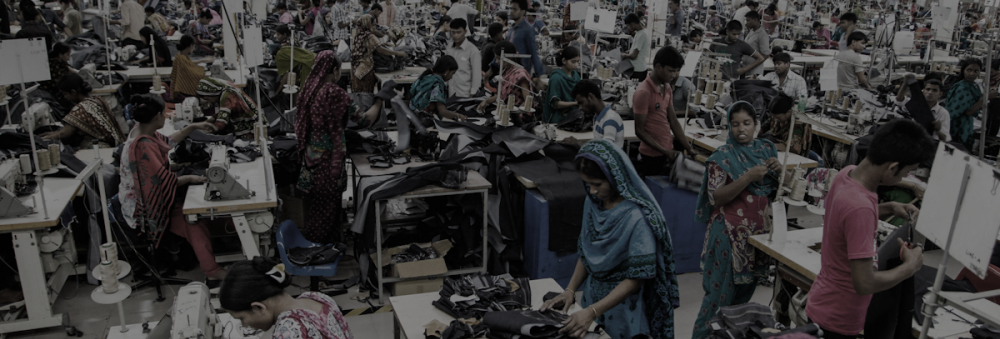For the past year I have been setting up Latorio. I have learned an incredible amount about how the fashion industry works, not to mention how the clothes themselves are made.
In this blog, I would like to explain why a ‘Made in England’ tag on an item of clothing does not guarantee quality or an ethical manufacturing process.
Firstly, I will chance a guess as to what “Made in England” might mean to you.
In your mind, a ‘Made in England’ tag on your t-shirt may conjure up the image of a sparkling-white factory, plenty of natural light pouring in from the windows onto the ample shop floor, where seamstresses work peacefully and happily.
Contrastingly, a label emblazoned with “Made in Bangladesh” is likely to evoke a more negative image, one of rows of seamstresses working in unsafe and dank factory rooms under exploitative conditions. Basically, I am describing sweatshop.
Was I right?
It is funny how much of a difference a word can make.
However, I have come to learn that this changing of words should not call to mind such a stark contrast.
In reality, ‘Made in England’ is much closer to the negative image of sweatshops that many people think of when they read the words ‘Made in Bangladesh’.
I remember the first time I went to visit a British factory manufacturing garments, last Summer. I walked onto the premises only to be greeted by row upon row of sewing machines being operated by the hardest working people I’d ever seen.
I recall seeing sweat literally dripping from their foreheads as they worked frantically to stitch together masses of amounts of fabric under strict time pressure. One of the managers told me that I shouldn’t walk around the factory too much because I would be a distraction to the work getting done.
To be honest, I didn’t instantly think that what I had just seen was a sweatshop, as I assumed that people working in difficult conditions like these would be rewarded with good pay.
Indeed, it wasn’t until after this visit that I learnt that these workers were getting paid less than minimum wage.
For me, that was when the words ‘Made in Britain’ became synonymous with that term usually reserved by the newspapers for the harsh environment of textile factories in Southern Asia: ‘sweatshop’.
I don’t think it is at all fair to blame the owners of these factories. This industry is one of the most cut-throat in the world. I mean, just look at how many clothing brands start up on Instagram. It is instead the big clients of these factories who are to blame. These large online retailers almost bully the factory owners to lower manufacturing prices down, to the point where the seamstresses and even the owner at times must suffer due to immense pressure.
The owners will rarely benefit; most of the time they make pennies anyway. I even know an owner who sews clothes himself in the aforementioned scenario.
On this visit I also got to see the dynamics between big clients and factories. A representative of the big client walked about the factory with her nose turned up. I later asked the owner how he felt about working with her and, to paraphrase, he said that the biggest clients are the toughest ones, and they always want everything as cheap as possible.
Some people will say there is a need for cheap clothing on the online market and this is the only way to get it. However, these companies like to work off a 90% profit margin. Therefore, there is a lot of room for them to pay these factories fairly.
There are companies out there which have ethical working conditions. One only has to look at the work done by brands like Able and Son of a Tailor. ‘Alternative Apparel’ are particularly worth mentioning, because not only are their working conditions safe and fair, but they also use sustainable materials.
This industry is unfair, not only abroad (which is common knowledge), but in the UK too. But it is not all doom and gloom, and you only have to look at the work of the companies I have just mentioned to see that we are taking steps in the right direction.
So, next time you see “Made in England” on an item of clothing, take a second to think twice about what this could mean. Latorio clothing is dedicated to fair and safe working conditions and pay, but large online and high street brands frequently are not.
Please share this blog,
Nathan Mistry

This was an eye opening article, very real and bringing to light such a sad reality in the industry.
Great to know Latorio is such an ethically run company.
I guess that I’m contributing to the the “sweatshops” since all that I care about is what I have left in my pocket. However, this has made me think twice.
This is a very complex issue. We should buy less and buy better so that it lasts longer. I have always worn “vintage” and re-designed” clothes as part of my own style … but I do worry about all the workers who need the small wages that they earn in these factories. What income will replace the volume manufacturing of fast fashion? Many in the rich west have the luxury of buying more expensive items that last .. but there are poor people in all of our communities who rely on cheap fashion. It isn’t a simple problem …..